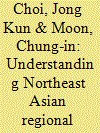|
|
|
Sort Order |
|
|
|
Items / Page
|
|
|
|
|
|
|
| Srl | Item |
| 1 |
ID:
144058


|
|
|
|
|
| Summary/Abstract |
Is the relatively long peace of Northeast Asia a result of crisis stability or general stability? The article introduces two stability concepts – crisis and general stability. Crisis stability occurs when both sides in military crisis are so secure due to its military capability and are able to wait out a surprise attack fully confident that it would be able to respond with a punishing counter attack. On the other hand, general stability prevails when two powers greatly prefer peace even to a victorious war whether crisis stability exists or not, simply because war has become inconceivable as a means of solving any political disagreements and conflicts. While crisis stability entails delicate balance of military power from the deterrence literature of security studies, general stability bases its logic of inquiry on constructivism where the idea of war aversion – categorically rejecting war as a means to end conflicts – becomes the prevailing norm. Therefore, this article empirically examines how Northeast Asia has sustained its peace through crisis stability and presents a new trend toward general stability.
|
|
|
|
|
|
|
|
|
|
|
|
|
|
|
|
| 2 |
ID:
077105


|
|
|
|
|
| Publication |
2007.
|
| Summary/Abstract |
Although it would be nice if the intelligence community's tradecraft or the academic community's theories could predict the future, it is essential that international security experts learn quickly and accurately from unfolding history. This article reports on a multiyear study of experts dealing with security on the Korean Peninsula. It examines how experts learn and what can derail rational updating. Three factors common to much of the work in security studies contribute to the problem: the tendency to treat the intentions of other actors as unknowable private information that is beyond empirical examination; the inclination to believe that power provides a parsimonious explanation, even though it is multifaceted and dependent on numerous components; and the penchant for engaging in "factor wars" over which causal factors are most important while paying little attention to the cumulative and interactive effect of multiple factors. Collectively, these three factors produce overconfidence in hindsight and leave experts prisoners to their preconceptions. The article investigates in the Korean case whether translating narrative expert beliefs systems (i.e., theories) into Bayesian networks can open minds and promote more appropriate updating, and suggests that it can
|
|
|
|
|
|
|
|
|
|
|
|
|
|
|
|
| 3 |
ID:
068531


|
|
|
| 4 |
ID:
082257


|
|
|
|
|
| Publication |
2008.
|
| Summary/Abstract |
This article discusses the analytically unbalanced theorizing in International Relations (IR) when it comes to a region, or subsystem. The tension is between theoretical universalism and contextual exceptionalism, and it is present in the IR community in Korea. If the former group is loyal to the general principles of scientific inquiry of social research, the latter group emphasizes the unique historical experience of Korea and its theorizing efforts to reflect such uniqueness. The author argues that for the IR community in Korea to develop its own name brand, the "Korean School," as an independent and influential force like the English School, it should collectively seek to bridge its perceptual representation concerning historical uniqueness with scientifically theorizing efforts while simultaneously incorporating the general theories of IR with unique regional independent variables
|
|
|
|
|
|
|
|
|
|
|
|
|
|
|
|
| 5 |
ID:
094993


|
|
|
|
|
| Publication |
2010.
|
| Summary/Abstract |
Northeast Asia has emerged as the center of gravity in contemporary international relations (IR), partly owing to China's rise, over the past two decades. In understanding regional dynamics in Northeast Asia, the (neo-) realist perspective has been dominant. Despite its rich analytical and empirical contribution, however, preoccupation with power and its distribution, blurred geographic focus, and built-in status quo bias have prevented the existing realist literature to capture the new reality of the region that can be characterized by trends toward liberal transition, the politics of national identity, and growing correlates of perception, domestic politics, and regional interactions. Against this backdrop, we attempt to undertake an inventory checking of new discourses on power, interest, and identity in accounting for regional change and stability as well as to shed new light on debates on theorizing of IR in Northeast Asia.
|
|
|
|
|
|
|
|
|
|
|
|
|
|
|
|
|
|
|
|
|